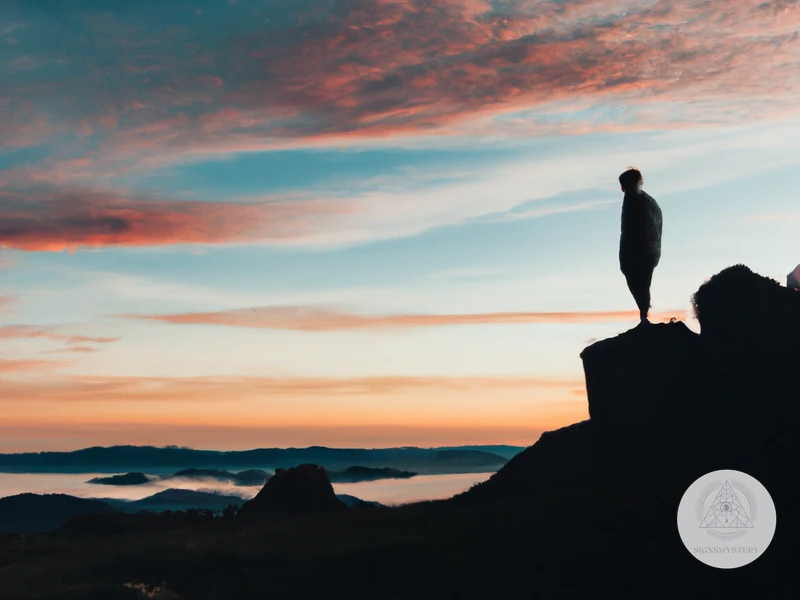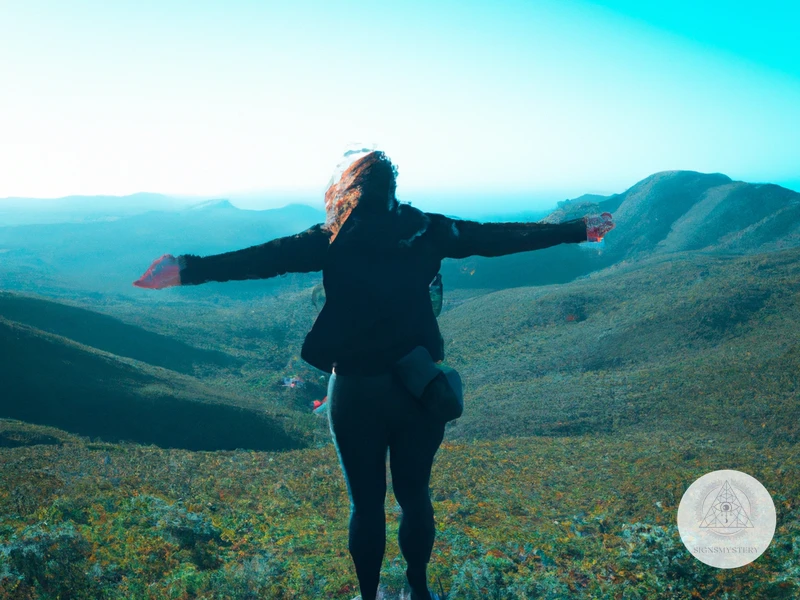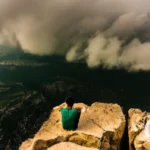Embarking on a vision quest can be a deeply transformative and life-changing experience. But with so many different types of vision quests available, it can be overwhelming to know where to start. That’s why we’ve created this guide to help you understand the basics of vision quests, the different types of quests available, and how to choose the right one for your needs. Whether you’re looking for a traditional Native American vision quest, a self-led journey, or a guided experience with a group, we’ll cover everything you need to know to prepare for and make the most of your vision quest. Let’s dive in and explore the world of vision quests together.
The Basics of Vision Quests

Embarking on a vision quest is a powerful and transformative experience that has been used by countless cultures throughout history. At its core, a vision quest involves retreating into nature, fasting, and meditating in order to connect with the divine and gain clarity on one’s life path. There are several different types of vision quests to choose from, including traditional Native American quests, self-led quests, guided quests, group quests, and nature immersion quests. Each type has its own unique benefits and challenges, so it is important to consider your intentions, level of experience, and budget when choosing the right one for you. Preparing for a vision quest involves physical, mental, and spiritual preparation, as well as gathering the necessary equipment and planning for post-quest integration. During the quest itself, it is important to stay connected with nature, maintain focus on your intentions, and practice self-care. Despite common myths surrounding vision quests, they can be safe and life-changing experiences when approached with respect and intention.
What is a Vision Quest?
A vision quest is a spiritual practice that has been carried out for centuries in various cultures around the world. It involves spending time alone in nature, with the purpose of gaining greater clarity, purpose and direction in life. The vision quest experience demands that individuals leave their everyday lives behind and venture out into nature, often without food or water, to seek a spiritual vision or encounter.
The traditional Native American vision quest, also known as Hanblecheyapi, has been passed down for centuries as an important rite of passage. During this quest, individuals fast and spend a number of days in solitude, often seeking guidance from their spirit guide, themselves, or a higher power (teyowishton in Lakota). This vision quest has become a standard for many who practice vision questing.
Today, there are many different variations of a vision quest available. The self-led vision quest, for example, is a solitary experience where individuals choose their location and time frame, along with the intention they hold for their quest. The guided vision quest involves a guide or teacher who will take you through each step of the journey, providing support and guidance as needed. The group vision quest involves a community and is a shared experience where individuals gain support and encouragement from others on the same journey. The nature immersion vision quest focuses on connecting with the natural world and can involve hiking, camping, and other activities.
Regardless of the type of vision quest, it’s important to remember that each experience is unique and personal. No two people will have the same vision, encounter and/or experience. Understanding the tradition is important for anyone planning a vision quest. It is equally important to consider the necessary preparation and precautions needed before, during and after the quest in order to gain the most out of the experience.
To understand more about the topic, read our article on Shamanism, which frequently utilizes vision quests as a method of spiritual awakening. Alternatively, use our checklist about vision quest preparation, to ensure that you’re ready for a successful experience. Read about animal spirit guides to understand what spiritual animals may have significance in your visions. Finally, we have an article debunking common myths relating to vision quests.
Importance of Choosing the Right Vision Quest
Choosing the right vision quest is crucial to ensure that you have a meaningful and transformative experience. Different types of vision quests can offer vastly different experiences, from traditional Native American quests to self-led quests in nature. When deciding which type of vision quest to go on, it’s important to consider your intentions and level of experience.
The right vision quest can help you gain clarity about your life’s path, heal emotional wounds, and develop a deeper connection with nature and your inner self. On the other hand, if you choose the wrong type of quest, you may not get the experience you were looking for, or worse, you could have a dangerous or unpleasant experience.
For example, a self-led vision quest can be an empowering experience for someone who is seeking solitude and independence. However, if you have little experience in survival skills, it could become a dangerous situation for you. A guided vision quest, while providing a safety net, may not provide the level of solitude or freedom you were hoping for.
The cost of each type of vision quest can vary widely as well. Considering your budget is important when choosing a vision quest. Some quests require specialized tools or equipment, such as a knife, a bow drill, or a tent. Others take place in remote locations, which can require travel expenses.
Thus, it’s important to do your research and find a vision quest that aligns with your intentions, level of experience, budget, and personal comfort. With the right preparation, the right vision quest can be a life-changing and transformative experience.
Once you’ve chosen the type of vision quest that’s right for you, it’s important to prepare yourself physically, mentally, and spiritually. Gather the necessary equipment, plan for post-quest integration, and consult with a teacher or guide to ensure that you’re fully ready for your journey. Preparation is key to a successful vision quest.
Choosing the right vision quest is important to ensure that you have a safe, meaningful, transformative, and potentially life-changing experience. Through careful consideration of your intentions, level of experience, and budget, as well as proper preparation, you can find the right vision quest for you.
Types of Vision Quests
There are several types of vision quests to choose from depending on your needs and preferences. The traditional Native American vision quest involves fasting and being alone in nature for several days, seeking spiritual guidance and clarity. For those who prefer a more flexible approach, there is the self-led vision quest where you have more control over your experience and timing. The guided vision quest involves a teacher or guide who will support and guide you throughout the process. The group vision quest is perfect for those who crave connection and community during their quest. Lastly, the nature immersion vision quest involves spending a long time in nature, connecting with the elements and wildlife. Each of these methods has its unique benefits and challenges. If you’d like to learn about typical steps of a vision quest, check out our typical vision quest steps guide. And for tips on how to integrate back into everyday life after your vision quest, read our article on the subject.
The Traditional Native American Vision Quest
The Traditional Native American Vision Quest is a powerful spiritual practice that involves going out alone into the wilderness for a period of time, typically four days and four nights, with minimal supplies. During this time, the individual seeks a vision, or a spiritual revelation or insight, that will guide them on their life path.
The Traditional Native American Vision Quest can vary among different tribes, but generally, there are some common elements to the practice. Here are some of them:
| Elements | Description |
| Vision Quest Site | The site is chosen based on its spiritual significance, and is often located in a remote and secluded area away from human disturbances |
| Sacred Objects | The person undertaking the quest will often bring sacred objects with them, such as tobacco, sage, and other items that hold personal significance |
| Water and Fire | The person will take a small amount of water and create a fire, which they will use to purify themselves through ritual cleansing |
| Vision Quest Ceremony | Before embarking on the quest, the person will participate in a ceremony that includes smudging, chanting, and drumming, to call upon spiritual guides and seek their protection and guidance during the quest |
| Vision Quest Fast | The person will abstain from food for the duration of the quest, relying only on water and the spiritual guidance they receive during the quest |
| Prayer and Meditation | The person will spend much of their time in prayer and meditation, seeking the vision they are seeking |
| Vision | At some point during the quest, the person will have a vision that provides them with guidance and insight. This vision may come in the form of a dream, a vision, or a strong feeling of intuition |
| Completion Ceremony | When the quest is complete, the person will return to the community, where a completion ceremony will be held to celebrate and honor their experience |
The Traditional Native American Vision Quest is a deeply spiritual and personal journey that is not to be taken lightly. It requires a great deal of preparation and respect for the traditions and culture of the Native American people. Those who are drawn to this practice should consult with a knowledgeable guide or teacher who can help them navigate the process and ensure that it is done with respect and integrity.
The Self-Led Vision Quest
The self-led vision quest is a type of vision quest where the participant creates their own quest. This type of vision quest is ideal for those who are independent and prefer a more individualized experience. Here are some key elements of the self-led vision quest:
- Location: Participants choose the location where they want to hold their quest. It can be a place that holds personal significance or somewhere they have always wanted to visit.
- Duration: The duration of the quest is also determined by the participant. However, it is recommended that the quest be at least three days in length to fully immerse oneself in the experience.
- Activities: Activities are also determined by the participant. They choose what spiritual practices they want to incorporate into the quest. This can include meditation, fasting, or spending time in nature.
- Guidance: While the participant is responsible for creating their own quest, it is still recommended that they seek guidance from a teacher or mentor. This can help to ensure that the quest is structured in a safe and effective way.
- Intention Setting: Before the quest begins, participants set their own intentions and goals. This can help to focus the experience and create a more meaningful outcome.
The self-led vision quest can be a powerful and transformative experience. However, it is important to remember that it also comes with its own set of challenges. Without the structure and support of a guided or group quest, self-led participants must be more self-sufficient. It is important to properly prepare both physically and mentally for this type of quest. Additionally, having a support system in place for post-quest integration can be beneficial.
The Guided Vision Quest
The Guided Vision Quest is a spiritual journey that is facilitated by a trained guide who will provide support and guidance throughout the quest. This type of vision quest is great for those who are new to the practice or those who prefer to have support during their journey. During a guided vision quest, the guide will work with the participant to clarify their intentions for the journey and offer tools to help them on their path.
The guide may also offer teachings and lessons to help the participant connect with nature, explore their inner self, and deepen their spiritual practice. These teachings may include meditation, journaling, dreamwork, or other techniques that are designed to help the participant gain insight and wisdom from their vision quest experience.
The guided vision quest often takes place in a remote wilderness setting or an area that is culturally significant and spiritually potent. The guide will work with the participant to create a safe and supportive environment for their journey and help them navigate any challenges or obstacles that may arise.
One of the benefits of a guided vision quest is that the guide can help the participant integrate the lessons and insights gained from the journey into their daily life. The guide may offer follow-up sessions or support to help the participant continue to deepen their spiritual practice and maintain the connection with nature and the inner self that was cultivated during the vision quest.
A guided vision quest can be a powerful and transformative experience for those who are seeking spiritual guidance and support on their journey. Whether you are a beginner or an experienced practitioner, a guided vision quest can offer an opportunity to connect with nature, explore your inner self, and gain insight and wisdom to help you on your path.
The Group Vision Quest
The Group Vision Quest is a type of journey that takes place with a group of individuals who embark on a shared quest for self-discovery and personal growth. This type of vision quest can be particularly helpful for those who are new to the process, as it allows individuals to receive support from others who are in a similar situation.
During a Group Vision Quest, participants will typically gather together at a designated location. This may be a wilderness area or a retreat center, depending on the specific program. The group will then engage in a variety of activities that are designed to help foster personal growth and spiritual development.
One of the key benefits of the Group Vision Quest is the opportunity for individuals to connect with others who share their interest in personal growth and spiritual development. This sense of community can be incredibly powerful, and can provide a sense of support and encouragement that is difficult to find elsewhere.
Another benefit of the Group Vision Quest is the opportunity to learn from others. During a quest, participants may share stories or insights with one another, which can help to deepen their understanding of themselves and their experiences. This can also help to provide additional perspective and insight into one’s own personal journey.
Of course, it’s important to note that the Group Vision Quest is not for everyone. Some individuals may prefer to embark on a solo vision quest, while others may prefer a guided or self-led approach. It’s important to carefully consider your own needs and preferences before deciding which type of vision quest is right for you.
If you do decide to participate in a Group Vision Quest, it’s important to choose a program that aligns with your own personal values and goals. Look for a program that is led by experienced facilitators who can help guide you through the process, and be sure to ask plenty of questions before signing up.
Ultimately, the Group Vision Quest can be a powerful tool for self-discovery and personal growth. By participating in this type of quest, individuals have the opportunity to connect with others, learn from one another, and deepen their understanding of themselves and their place in the world.
The Nature Immersion Vision Quest
The Nature Immersion Vision Quest is a modern take on the traditional Native American Vision Quest. This type of quest is designed to help individuals connect with nature and gain a deeper appreciation for the natural world. The Nature Immersion Vision Quest typically involves spending several days in a remote wilderness area, completely immersing oneself in the rhythms and cycles of the natural world.
During a Nature Immersion Vision Quest, participants will spend most of their time alone, in silence and solitude. There may be periods of fasting and meditation, as well as periods of physical activity, such as hiking or yoga. The goal is to create a deep and meaningful connection with nature, allowing the participant to gain insights and clarity about their life path and purpose.
One of the key components of a Nature Immersion Vision Quest is the use of ritual and ceremony. Participants may be encouraged to create altars or sacred spaces to help them connect with the natural world. They may also participate in rituals such as a sweat lodge ceremony or a fire ceremony to honor the elements and give thanks for the guidance and support of the natural world.
The Nature Immersion Vision Quest can be a powerful and life-changing experience for those who are seeking a deeper level of connection with nature and themselves. It can help to reduce stress, anxiety, and depression, and promote feelings of peace, gratitude, and joy.
If you are interested in embarking on a Nature Immersion Vision Quest, it is important to choose a reputable guide or teacher who has experience leading these types of quests. You will also need to ensure that you have the physical and mental stamina to endure several days in a remote wilderness area, and that you have the necessary equipment and supplies to ensure your safety and comfort.
The Nature Immersion Vision Quest is a unique and powerful way to connect with the natural world and gain clarity, insight, and direction for your life. If you are feeling called to embark on a spiritual journey in nature, a Nature Immersion Vision Quest may be just what you need.
Choosing the Right Vision Quest for You

When choosing the right vision quest for you, there are several factors to consider. Firstly, it’s important to consider your intentions and what you hope to gain from the experience. Will you be seeking clarity on a specific life decision or looking for spiritual connection? Next, think about your level of experience with vision quests. If you’re new to the practice, a guided vision quest may be a good option. If you’re more experienced, a self-led or traditional Native American vision quest may be more suitable. Budget should also be taken into account as some types of vision quests can be more expensive than others. Finally, do your research and find a reputable and trustworthy organization or guide to lead you on your quest. Consider creating a table or list to compare the different types of vision quests and how they align with your personal needs and budget. Remember, choosing the right vision quest is crucial for a meaningful and transformative experience.
Consider Your Intentions
Consider Your Intentions: Before embarking on a vision quest, it’s important to consider your intentions. Ask yourself what it is that you want to achieve or gain from this experience. Your intentions may range from personal growth and self-discovery to healing, clarity, and guidance.
Take the time to reflect on your current life situation and any challenges or obstacles you may be facing. Identifying the areas of your life that require the most attention and focus can help you choose the right type of vision quest that best aligns with your intentions.
It’s also important to consider the timing of your vision quest. Are you going through a major life transition, such as a career change or relationship breakup? Or do you simply feel a strong pull to reconnect with nature and your inner self? Clarifying your intentions and timing can help you choose a vision quest that will provide you with the support and guidance you need to move forward.
Remember, your intentions will serve as your guiding light throughout the vision quest process. They will help you stay focused, motivated, and aligned with your purpose. So take the time to consider them carefully before choosing the type of vision quest that’s right for you.
Think About Your Level of Experience
When considering which vision quest is right for you, it is important to think about your level of experience. Some vision quests require more physical and mental endurance, while others may be more suitable for beginners or those with limited outdoor experience. Here are some examples of different vision quests and the level of experience they require:
| Vision Quest | Level of Experience |
|---|---|
| Traditional Native American Vision Quest | Intermediate to Advanced |
| Self-Led Vision Quest | Beginner to Intermediate |
| Guided Vision Quest | Beginner to Advanced |
| Group Vision Quest | Beginner to Advanced |
| Nature Immersion Vision Quest | Beginner to Intermediate |
As you can see, some vision quests are more intense and physically challenging than others. The traditional Native American Vision Quest, for example, involves several days of fasting and solitude in the wilderness, which may be too daunting for beginners. On the other hand, a guided vision quest or group vision quest may be perfect for someone new to this type of experience who wants a supportive environment and guidance throughout the process.
It’s important to be honest with yourself about your abilities and limitations when choosing a vision quest. Overestimating your abilities could lead to physical or mental strain, while underestimating yourself may cause you to miss out on growth opportunities. Don’t be afraid to ask questions and seek guidance when choosing a vision quest that is right for you based on your level of experience.
Take Your Budget Into Account
When considering embarking on a vision quest, it’s important to take your budget into account. Different types of vision quests come with different costs, so it’s important to research and understand what you’re signing up for financially.
The Traditional Native American Vision Quest: This type of vision quest may involve travel to a specific location, participation in a ceremony led by an experienced guide or shaman, and payment for the services and materials provided. As this is a traditional practice with cultural significance, it’s important to recognize the value of the knowledge and experience gained through participation.
The Self-Led Vision Quest: This type of vision quest may involve minimal costs, as it can be completed alone and in a remote location. However, it’s important to consider the cost of necessary equipment and supplies, such as camping gear, food, and water.
The Guided Vision Quest: This type of vision quest may involve a fee for the guide or organization leading the experience. It’s important to research and compare prices, as different guides and organizations may offer varying levels of support and resources.
The Group Vision Quest: This type of vision quest may involve a fee to participate in a group led by an experienced guide or organization. The cost may include accommodations and meals, as well as the cost of the guide’s services.
The Nature Immersion Vision Quest: This type of vision quest may involve travel to a specific location and payment for accommodations, meals, and guide services.
When considering your budget for a vision quest, it’s important to also take into account any travel expenses, as well as the potential need for time off work. It’s important to find a balance between paying for a valuable and significant experience and ensuring that the cost fits within your financial means. It’s also important to factor in any potential financial stress that may detract from the experience itself. By taking your budget into account and planning accordingly, you can set yourself up for a fulfilling and transformative vision quest experience.
Do Your Research
When it comes to choosing the right vision quest, it’s important to do your research. This will help you to have a better understanding of what each type entails and what may be the best fit for your needs. Here are some things to consider while doing your research:
- Read books and articles: There are countless books and articles available that provide information on different types of vision quests. Look for ones that are written by reputable authors and have good reviews.
- Watch videos and documentaries: Watching videos and documentaries can give you a visual representation of what a vision quest looks like and may answer some questions you have.
- Attend workshops or seminars: Look for workshops and seminars led by experienced vision quest guides. This will give you the opportunity to ask questions and gain first-hand knowledge from those with experience.
- Talk to others: If you know anyone who has done a vision quest before, talk to them about their experiences. They may have helpful advice or recommendations for you.
- Research the guide or organization: If you’re considering a guided vision quest, be sure to research the guide or organization. Look for reviews or testimonials from past clients and see if they have any certifications or credentials.
By doing your research, you’ll be better equipped to make an informed decision on which vision quest is right for you. Remember to consider your intentions, level of experience, budget, and personal preferences when making your decision.
Preparing for Your Vision Quest
Preparing for your Vision Quest can be a complex and multifaceted process. Consulting with a teacher or guide can provide helpful insight and ensure that you are fully prepared for the journey ahead. Physical preparation is also crucial, as a proper level of fitness will support your body during the challenging physical demands of the quest. Mental and spiritual preparation are also essential, as you will need to set intentions and clear your mind in order to have a successful experience. Gathering the necessary equipment, such as appropriate clothing and camping gear, will also be important. Finally, planning for post-quest integration can ensure that you are able to integrate the lessons learned from your experience back into your daily life. With careful preparation and guidance, your Vision Quest can be a truly transformative experience.
Consult with a Teacher or Guide
Consulting with a teacher or guide is an important step in preparing for your vision quest. They can provide guidance and support in choosing the right type of quest for you and in preparing mentally, physically, and spiritually for the experience. Here are some things to consider when choosing a teacher or guide:
| Considerations | Questions to Ask |
|---|---|
| Experience | How many vision quests have they led? What is their specialty? |
| Qualifications | What kind of training or certifications do they have? Are they affiliated with any organizations? |
| Approach | What is their philosophy or approach to vision quests? Do they have any specific techniques or methods? |
| Compatibility | Do you feel comfortable and safe with them? Can you trust them to guide you through this journey? |
| Logistics | What kind of support will they provide before, during, and after the quest? What kind of supplies or equipment will they provide? |
Keep in mind that not all teachers or guides are the same, so take the time to research and compare different options before making a decision. It’s also important to establish a clear understanding of expectations and boundaries with your teacher or guide to ensure a positive and productive experience.
Physical Preparation
Physical preparation is an essential aspect of any vision quest, as it requires spending an extended time in nature without modern conveniences. One of the key physical preparations is to ensure that your body is in good shape. You should start exercising regularly for at least a few months leading up to your quest, focusing on both cardio and strength training. This will help you build endurance and stamina, allowing you to better handle the physical challenges of a vision quest.
Another crucial aspect of physical preparation is getting the right gear. You will need to invest in proper hiking boots, as well as clothing that is comfortable and durable enough for the terrain you’ll be traversing. Depending on the location and time of year, you may also need to bring a warm sleeping bag, a rain poncho, and other gear to keep you comfortable in harsh weather conditions.
In addition to building physical endurance and getting the right gear, it’s important to take care of your body during the vision quest itself. Be sure to eat nutritiously beforehand, as well as during the quest if you bring food. Hydration is also essential, so pack enough water with you. Any necessary medications or supplements should also be brought along.
It’s essential to be aware of any pre-existing medical conditions you have and prepare accordingly. If you have any concerns about your ability to handle a Vision Quest physically, consult with your doctor beforehand. It’s common for vision quests to involve some degree of hiking at high altitudes or other strenuous physical activity, and you don’t want to put yourself in danger by overestimating your abilities.
By prioritizing physical preparation, you can help ensure that you’re equipped with the necessary
Subscribe to Our Newsletter
Sign up to receive the latest news and updates.
Mental Preparation
Preparing for a vision quest requires more than just physical preparation, it also requires mental preparation. This preparation involves clearing your mind of any mental distractions and creating the appropriate mindset for the journey ahead.
One important step in mental preparation is setting intentions and goals for the quest. Take some time before the quest to meditate on what you hope to gain from the experience. This can help guide your thoughts and actions during the quest.
Another aspect of mental preparation is learning to quiet the mind and focus on the present moment. This can be achieved through practices like meditation or mindfulness. By training your mind to be present, you can better connect with the natural world and your own inner wisdom during the vision quest.
Additionally, confronting fears and limiting beliefs is an important part of mental preparation. Recognize any negative thought patterns or beliefs that may be holding you back and work on releasing them. This can be done through journaling, therapy, or other self-reflection practices.
It’s also helpful to prepare mentally for the challenges that may arise during the quest. This can involve visualization exercises where you imagine yourself successfully overcoming obstacles and staying focused on your intentions.
By taking the time to mentally prepare for a vision quest, you can create a strong foundation for a transformative and meaningful experience.
Spiritual Preparation
Spiritual preparation is a crucial element of any vision quest experience. Here are some steps you can take to prepare yourself spiritually for your upcoming journey:
| Step 1: Set Your Intentions | Before embarking on your vision quest, take some time to set clear intentions for what you hope to gain from the experience. Your intentions should be focused on your spiritual growth and development, rather than any external goals or achievements. |
| Step 2: Practice Meditation, Yoga, or Prayer | Cultivating a regular practice of meditation, yoga, or prayer can help you connect more deeply with your inner self and the divine. This can help you to quiet your mind and cultivate a sense of inner peace and clarity that will serve you well during your vision quest. |
| Step 3: Seek Guidance from Spiritual Leaders or Elders | If possible, seek guidance from a respected spiritual leader or elder in your community. They may be able to offer advice and insights that will help you to prepare for your quest and navigate any challenges you may encounter along the way. |
| Step 4: Spend Time in Nature | Spending time in nature is an important component of spiritual preparation for a vision quest. It can help you to connect with the natural world and deepen your understanding of your place in the universe. Spend time hiking, camping, or simply sitting in nature to gain a greater sense of the interconnectedness of all things. |
| Step 5: Cleanse Your Mind, Body, and Spirit | In the days leading up to your vision quest, take some time to cleanse your mind, body, and spirit. This can be done through practices such as fasting, prayer, or ritual washing. The goal is to enter your quest with a clean and open heart, ready to receive the guidance and insights that await you. |
By following these steps, you can prepare yourself spiritually for the profound experience of a vision quest. Remember to approach the journey with an open mind and heart, ready to receive whatever guidance and insights come your way.
Gather the Necessary Equipment
When preparing for your vision quest, it’s important to gather all the necessary equipment beforehand so that you can focus on your experience without any distractions. Here are some essential items that you should consider bringing:
| Item | Description |
|---|---|
| Tent or Shelter | You’ll need a place to sleep and stay dry in case of rain. Make sure to choose something lightweight and easy to set up. |
| Sleeping Bag | A warm and comfortable sleeping bag is imperative for cold nights outdoors. Choose one that’s suitable for the temperature range in the area where you’ll be. |
| Personal Hygiene Items | Don’t forget to bring toothpaste, a toothbrush, toilet paper, and any other personal hygiene items that you’ll need during your quest. |
| Water Container | Staying hydrated is essential during a vision quest, so be sure to bring a sturdy water bottle or canteen to carry with you during the day. |
| Cooking Supplies | If you’re bringing food with you, make sure to bring a portable stove or other cooking supplies as well as utensils and plates/bowls. |
| Emergency Supplies | It’s important to plan for emergencies, so bring a first-aid kit and any necessary medications, as well as a flashlight with extra batteries and a whistle. |
| Ceremonial Items | If you have any sacred or ceremonial objects that you’d like to bring, make sure to pack them carefully and respectfully. |
In addition to the items listed above, you should also consider the specific requirements of the vision quest you’ll be undertaking. For example, if you’ll be participating in a group quest, you may need to bring additional supplies like a drum or other instruments. Taking the time to gather all the necessary equipment beforehand will help you approach your vision quest with a clear and focused mind.
Plan for Post-Quest Integration
Once you have completed your vision quest, it is important to have a plan for post-quest integration. This process involves taking the lessons and insights gained from your experience and incorporating them into your daily life. It can be easy to slip back into old patterns and routines, but with intentional effort, you can maintain a deeper connection to your inner self and the natural world.
Reflect: Take some time to reflect on your experience. Journal about your insights, emotions, and any key moments during your vision quest. When you look back at your notes in the future, it can help you remember your journey and the lessons you learned.
Meditate: Incorporate a daily meditation practice to help you stay centered and connected to your inner self. This will allow you to continue processing your experience and insights.
Connect with Others: It can be beneficial to connect with others who have gone through a vision quest or engage in similar practices. This can help you stay motivated and supported as you integrate your experience into your daily life.
Create Rituals: Consider creating rituals or practices that help you stay connected to the natural world and your inner self. This can be as simple as taking daily walks in nature or incorporating a mindfulness practice before bed.
Stay Committed: Integrating the lessons from your vision quest is an ongoing process. It is important to stay committed to your personal growth and continue to make time for self-reflection and connection with nature.
During Your Vision Quest
The experience of going on a vision quest can be both challenging and rewarding. During your vision quest, it’s important to connect with nature and let yourself become immersed in the environment. Stay focused on your intentions and maintain an open mind and heart. Taking care of yourself physically, emotionally and spiritually is crucial. Self-care can include taking breaks when needed, getting plenty of rest and nourishment, and being gentle with yourself. It’s important to listen to your inner self and trust your intuition. Remember that your vision quest is a personal journey, so don’t compare yourself to others. Embrace the experience and all it has to offer.
Connect with Nature
Connecting with nature is an essential part of any vision quest experience. When you are out in the natural world, you can tap into the healing energy of the earth and find yourself in harmony with the universe. You can connect with the animals and plants around you, and gain a deeper sense of your place in the world.
Take Time to Observe
Nature is a beautiful tapestry of life, and if you take the time to observe the smallest details, you can find beauty in even the tiniest leaf or rock. Take the time to appreciate the landscape around you and the life that thrives within it. Observe the birds, insects, and animals that cross your path. Listen to the sound of the wind and the rustling of leaves. Marvel at the play of light and shadow upon the earth. These observations can help you to find stillness within yourself and connect to the power of nature.
Develop a Relationship with the Land
When you spend time in a specific natural environment, you begin to develop a deeper relationship with the land. You can come to understand the unique energies present in the area, and connect with the spirit of the place. Walk around and get to know the terrain, and pay attention to the plants and wildlife that call it home. Take time to reflect on how you feel in the space, and any insights or messages that might come to you.
Eat Wild Foods
Part of connecting with nature is also finding nourishment within it. In many areas, there are a variety of wild foods that can be foraged for sustenance. Eating wild food can be a powerful way to connect with the environment and support your physical well-being. Take time to learn about edible plants in the area, and incorporate them into your meals.
Express Gratitude
Finally, give thanks for the beauty and abundance of nature. Whether through prayer, song, or simply giving thanks, expressing gratitude can help you to cultivate a deeper connection to the natural world and all the beings within it. Recognizing the gifts of nature can open your heart and help you to feel a sense of interconnectedness with all that is.
Connecting with nature is a vital and transformative part of any vision quest. Take the time to observe, develop a relationship with the land, eat wild foods, and express gratitude for the beauty of the natural world. When you allow yourself to be fully present in nature, you can access a deeper sense of inner truth and wisdom.
Stay Focused on Your Intentions
Staying focused on your intentions is crucial during a vision quest. Your intentions are what you hope to gain, achieve or learn during your quest. Without focus on your intentions, it’s easy to become distracted and lose sight of what you hope to gain from the experience.
To help stay focused on your intentions, consider these tips:
| Set Clear Intentions: | Before embarking on your vision quest, take some time to reflect on the specific intentions that you hope to focus on. Write them down and revisit them often. Setting clear intentions will help you stay focused on what you hope to achieve. |
| Visualize: | Visualization techniques can help you stay focused on your intentions. Take a moment to visualize yourself achieving your goals. This can help you maintain focus and motivation during your vision quest. |
| Avoid Distractions: | It’s important to avoid any unnecessary distractions during your vision quest. This means turning off your phone, avoiding social media, and limiting interaction with others while on your quest. Minimizing distractions can help you stay focused on your intentions. |
| Remind Yourself: | During your vision quest, take time to remind yourself of your intentions. You can do this through journaling or meditation. Reminding yourself of your intentions can help you maintain perspective and stay focused. |
| Stay Flexible: | While it’s important to stay focused on your intentions, it’s also important to stay flexible. Letting go of specific outcomes and remaining open to unexpected experiences can often lead to deeper insights and growth. |
By staying focused on your intentions, you increase the chances of having a meaningful and transformative vision quest experience. Take the time to set clear intentions and utilize techniques to help maintain focus on those intentions.
Maintain an Open Mind and Heart
One of the key aspects of a successful Vision Quest is “Maintaining an Open Mind and Heart.” This simply means being receptive to whatever experiences come your way during the quest and not being judgmental or closed off.
| 1. Let go of expectations: | It is natural to have some expectations when going on a Vision Quest, but it is important to let them go as much as possible. Be open to whatever comes your way and avoid judging or trying to control the experience. |
| 2. Focus on the present moment: | Don’t get caught up in thoughts of the past or worries about the future. Stay focused on the present moment and what is happening around you. This will help you to be more receptive to the experiences that are meant for you. |
| 3. Practice mindfulness: | Mindfulness means paying attention to the present moment without judgment. Practice being mindful throughout your Vision Quest by noticing your surroundings, your breath, and your thoughts without clinging to them or pushing them away. |
| 4. Be open to learning: | Part of maintaining an open mind and heart is being open to learning from the experiences you have. Be curious and ask questions. Even if an experience seems challenging or uncomfortable, try to see it as an opportunity for growth and learning. |
| 5. Embrace vulnerability: | Being vulnerable can be uncomfortable, but it is an essential part of personal growth and transformation. Allow yourself to be vulnerable during your Vision Quest and remain open to what you might learn about yourself and others. |
By maintaining an open mind and heart during your Vision Quest, you are creating space for new experiences and insights that can help you to grow and develop as a person. Remember to stay present, be receptive, and let go of judgment as much as possible.
Practice Self-Care
During a vision quest, it’s important to prioritize self-care to ensure that you’re able to fully connect with yourself and nature. Here are some tips for practicing self-care during your vision quest:
1. Stay Hydrated: Make sure to bring plenty of water and stay hydrated throughout your journey. Dehydration can lead to fatigue and negatively affect your focus.
2. Nourish Your Body: Pack healthy, energy-boosting snacks and simple meals to keep your body fueled. Avoid foods that are heavy or difficult to digest, as they can drain your energy and make it harder to focus.
3. Rest and Recharge: Listen to your body and make sure to rest when you feel tired. Finding a comfortable spot to take a nap or meditate can help you recharge and refocus.
4. Take Care of Your Mental Health: Your vision quest is a time for self-reflection and contemplation, but be sure to prioritize your mental health. If you start feeling overwhelmed or anxious, take a break and practice deep breathing or other mindfulness techniques to calm your mind.
5. Practice Yoga or Stretching: Practicing yoga or stretching can help increase blood flow and flexibility, while also promoting relaxation and reducing stress.
6. Connect with Nature: Spend some time in nature, and allow yourself to fully immerse in the natural surroundings. Walk barefoot, listen to the nearby animals and plants, and feel the elements around you.
Remember, self-care during a vision quest could be entirely different from typical day-to-day routines, the ultimate aim is to prioritize your well-being and ensure that you’re able to connect with yourself and nature.
Listen to Your Inner Self
During your vision quest, it is essential to listen to your inner self. The purpose of a vision quest is to gain insight and wisdom from within and connect with the universe. It is a time to let go of the distractions and noise of everyday life and tune into your inner voice. Your inner self knows what you need to hear and the answers to your questions.
To listen to your inner self, you need to practice mindfulness and presence. Be in the moment and pay attention to your thoughts, sensations, and emotions without judgment. Avoid distractions such as technology, books, or even music. Nature is loud enough, and you need to be present in the moment to hear and understand what it is trying to tell you.
Trust your instincts and intuition. Your inner self communicates with you through your intuition. Do not discredit your instincts, as they are powerful tools for guidance. Listen to what your body, mind, and spirit are telling you. When something feels right or wrong, listen to that feeling and act accordingly. Your inner self knows what is best for you.
Be open-minded and receptive. You may receive messages through various channels such as dreams, signs, or symbols. Be open to the messages, even if it seems unclear or challenging to interpret. Trust that the universe is communicating with you in the best way it knows how.
Journaling is an excellent way to keep track of your thoughts, emotions, and messages during your vision quest. Write down any insights, feelings, or observations that come up during your quest. It will help you reflect and make sense of the experiences and messages you receive.
By listening to your inner self, you can gain valuable insight, guidance, and wisdom during your vision quest. Trust yourself, be open, and present in the moment. The answers you seek are inside you; all you need to do is listen.
Conclusion
In conclusion, embarking on a vision quest can be a powerful way to connect with nature, reflect on oneself, and gain clarity on life’s purpose and direction. With so many different types of vision quests to choose from, it’s important to take the time to consider your intentions, experience level, and budget before making a decision.
Whether you choose a traditional Native American vision quest or a self-led vision quest, it’s crucial to prepare yourself physically, mentally, and spiritually before embarking on the journey. Consulting with a teacher or guide can also provide valuable insight and support.
During the quest, staying focused on your intentions, connecting with nature, and practicing self-care can help you stay grounded and open to the messages your inner self may be trying to communicate.
After the quest, it’s important to plan for post-quest integration and continued self-reflection to bring the insights gained during the quest back into daily life.
Overall, a vision quest can be a transformative and life-changing experience for those who approach it with intention, preparation, and an open mind.
Frequently Asked Questions
What is the purpose of a Vision Quest?
A Vision Quest is a transformative experience that helps individuals connect with their inner selves and the natural world. It is a powerful tool for self-discovery, personal growth, and spiritual development.
Do I need experience to go on a Vision Quest?
No, experience is not necessary for most types of Vision Quests. However, for some more advanced or extreme Vision Quests, it is recommended to have prior experience or preparation.
Can anyone go on a Vision Quest?
Most people can go on a Vision Quest, but it is important to consider any physical or psychological limitations. It is always wise to consult with a doctor or healthcare provider before embarking on any type of spiritual or physical journey.
How much does a Vision Quest cost?
The cost of a Vision Quest varies depending on the type, length, and location of the quest. Prices can range from a few hundred dollars up to several thousand dollars for a more intensive or guided experience.
What should I bring on a Vision Quest?
It is important to bring essential items such as appropriate clothing, food, and water. Other important items may include a journal, pen, sleeping bag, and personal items such as crystals or sacred objects. A detailed list will be provided by the guide or organization leading the Vision Quest.
Can I eat during a Vision Quest?
Most Vision Quests involve a period of fasting or limited food intake to help facilitate a deeper connection with nature and the self. However, individual experiences may vary, and some Vision Quests may allow for some nourishment during the quest.
What happens after a Vision Quest?
The post-Quest integration period is just as important as the Quest itself. It is important to take time for introspection, rest, and gentle reintegration into daily life. Many Questers find the experience energizing and are motivated to make positive changes in their lives.
How long does a Vision Quest last?
The length of a Vision Quest varies depending on the type and location. Some may last for a few days, while others may last for a few weeks. It is important to choose a Quest that fits your schedule and availability.
Is a Vision Quest safe?
For most people, Vision Quests are safe when conducted with experienced guides and in appropriate settings. However, as with any physical or spiritual activity, there is always some level of risk. It is important to do your research and choose a reputable organization or guide for your Vision Quest.
Do I have to be religious to go on a Vision Quest?
No, a Vision Quest is not necessarily a religious experience. It can be a spiritual experience that is tailored to your own personal beliefs and values. It is an opportunity to connect with the natural world and your inner self in a deeper and more profound way.










